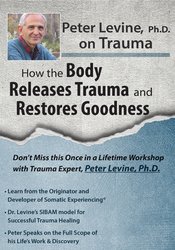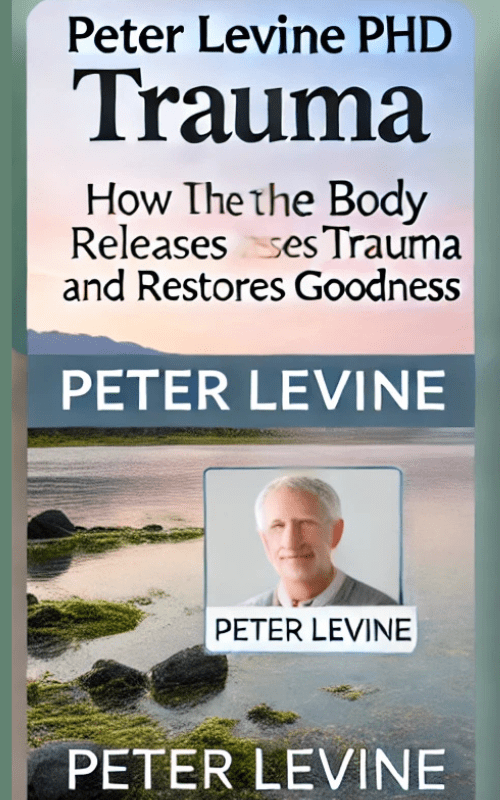Peter Levine PhD on Trauma -How the Body Releases Trauma and Restores Goodness – Peter Levine
Peter Levine PhD on Trauma -How the Body Releases Trauma and Restores Goodness – Peter Levine has the same quality as the author’s salapage.
Overview
Salepage check: Peter Levine PhD on Trauma -How the Body Releases Trauma and Restores Goodness
Author: Peter Levine
- Faculty:
- Peter Levine
- Duration:
- 4 Hours 49 Minutes
- Format:
- Audio and Video
- Copyright:
- May 01, 2018
Description
International trauma expert and author, Peter A. Levine, Ph.D. will teach you how sensation-based treatment (as opposed to emotional or rational-based treatment) can be effective for trauma treatment. He discusses the important principles in successful trauma treatment, and uses his own successful renegotiation of a personal traumatic event as an example.
Representing the full scope of his life’s work, Dr. Levine discusses the evolutionary underpinnings of trauma. This recording includes an in-depth review of how trauma is related to the ethnological concept of tonic immobility, as well as the roadmap of the Polyvagal system – a fascinating neurophysiological model for understanding how we shift between the states of fight-or-flight, shutdown, and social engagement. Dr. Levine provides simple containment tools to help you develop your awareness of these state changes in order to more effectively engage your client in trauma therapy.
Handouts
| Updated Manual (42.66 MB) | 74 Pages | Available after Purchase | |
| Color Updated Manual (4.79 MB) | 74 Pages | Available after Purchase |
Outline
Child Development: The Signs of Trauma in Each Developmental Period:
- Pre-Natal
- Hormonal interactions between mother and child
- Birth Stress
- Year One
- Safety, affection and containment
- Proprioceptive development
- The Dopamine System
- The space to explore one’s effect on the world
- The formation of a self that is different from Mom and Dad
- Testing boundaries
- Age 3-5
- The Biology and balance of shame
- The importance of shame in society
- The signs of overshaming
- The signs of undershaming
- The initial forays into sexuality
- The importance of flirting
- How these sames stages replay themselves out in later life
- The initial forays into sexuality
The Naturalistic Mechanisms of Trauma
- Understanding our primary survival tactics and how they play out in the body: Flight, fight, freeze and collapse
- 500 million years of evolution: Our Polyvagal underpinnings
- How the Dorsal Vagal System is related to shutdown and collapse
- Fight or flight: Sympathetic/adrenal System mobilization, Returning to our Mammalian birthright: The Ventral vagal system and social engagement
- How we get “stuck”
- Tonic immobility – The fallback to freeze
- Freeze couples with Fear
- Dissociation
- Bracing and terror
- Euphoric dissociation
- Collapse
- Somatic and emotional – syndromes and complexes
- Emotional – anxiety, depression
- Somatic – chronic pain, fibromyalgia
- Autonomic – migraines, irritable bowel
Resolving Traumatic Reactions
- The importance of “Bottom-Up” processing
- The Paul MacLean’s Triune Brain
- In an Unspoken Voice
- Somatic Experiencing©
- Renegotiation vs. Reliving
- Restoration of self-regulation
- Trauma isn’t about the event, but the body’s inability to process and integrate the nervous system charge
- The importance of developing a felt sense
- The nine basic stages of trauma treatment
- Containment of strong sensation and emotion
- Pendulation – The dual opposites of sensation
- Titration – going gradually
- Completion
- Renegotiation of active for passive responses
- Simple exercises that you can use in your practice
Spirituality and Trauma
- Trauma as one of the 4 avenues to enlightment
- Lessons from the Kundalini
- A feeling of “okayness”, wholeness and trust in the world
- And other side effects of effective trauma treatment
- The importance of maintaining balance in one’s life
Faculty

Peter Levine, Ph.D. Related seminars and products: 26
Dr. Peter Levine holds doctorates in both medical biophysics and psychology. He is the developer of Somatic Experiencing® (SE), a naturalistic body-awareness approach to healing trauma, which he teaches all over the globe. Dr. Levine is also the founder of the Foundation for Human Enrichment and was a stress consultant for NASA during the development of the space shuttle.
An accomplished author, Dr. Levine penned Healing Trauma, Sexual Healing and the bestselling book, Waking the Tiger. He also co-authored with Maggie Kline Trauma Through a Child’s Eyes and Trauma-Proofing Your Kids. His latest book, In an Unspoken Voice: How the Body Releases Trauma and Restores Goodness, is a testament to his lifelong investigation into the connection between evolutionary biology, neuroscience, animal behavior, and more than 40 years of clinical experience in the healing of trauma.
Dr. Levine was honored in 2010 with a Lifetime Achievement Award from the United States Association for Body Psychotherapy (USABP) and is a Senior Fellow at Meadows Behavioral Healthcare.
Speaker Disclosure:
Financial: Peter Levine is the Developer of Somatic Experiencing®. He is the founder and Senior Advisor to the Foundation for Human Enrichment; and Senior Advisor to The Meadows Addiction Treatment Center. Dr. Levine receives a speaking honorarium from PESI, Inc.
Non-financial: Peter Levine is a member of the American Psychological Association; Humanistic Psychological Association; and International Society for Traumatic Stress Studies.
Curriculum
FAQs
Requirements
- Basic understanding of trauma and its effects on the body and mind.
- A stable internet connection for accessing digital course materials.
- A device (PC, tablet, or smartphone) to watch the video lectures.
Features
- Comprehensive Video Lectures: Delivered by Peter Levine, PhD, focusing on somatic experiencing and trauma resolution.
- Step-by-Step Techniques: Learn practical methods to release trauma stored in the body.
- Real-Life Case Studies: Insightful examples that bring theory into practice.
- Lifetime Access: Study at your own pace with on-demand videos.
- Expert Insights: Developed by one of the world’s leading authorities on trauma healing.
Target audiences
- Therapists, counselors, and mental health professionals seeking advanced trauma recovery techniques.
- Individuals interested in understanding and healing their own trauma.
- Students of psychology and trauma studies.
- Coaches and holistic practitioners looking to integrate trauma healing into their practice.


